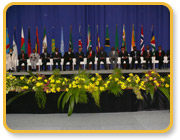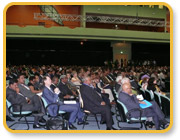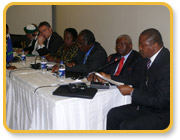 |
Background
The Southern Africa Trust and SADC Employers' Group initiated the B4D Pathfinder in response to a recommendation by member states at the SADC Conference on Poverty and Development (Mauritius, April, 2008) to develop mechanisms to drive change in the social and environmental performance of both domestic and foreign investors with a view to end poverty.
The Southern Africa Trust and SADC Employers' Group propose a set of management tools (the B4D Pathfinder product offerings) underpinned by the concept of inclusive business. They offer an innovative approach to Corporate Social Responsibility (CSR) by helping companies go beyond corporate giving and integrate sustainable development objectives into their core business. They also take into account the following:
- emergent nature of inclusive business globally,
- challenges to its implementation in SADC, and
- general status of other CSR and sustainable development frameworks in southern Africa.
Accordingly, the best option is a combination of the following 'user-friendly' product offerings. They include:
- B4D Charter - expressing commitment and aspiration,
- B4D Barometer - helping a business to include the poor in its value chain and promote accountability through public reporting, and
- B4D Toolkit - a set of knowledge-based tools to guide a company towards best practice.
|

|

|

|
What is B4D
B4D Pathfinder
 |
|
 |
|
The B4D (Business for Development) Pathfinder focuses on 'inclusive business' as an opportunity to enhance development in the Southern African Development Community (SADC) region by harnessing the knowledge, skills, resources and strengths of the private sector.
Inclusive business aims to overcome poverty by incorporating low income communities into a company's value chain while maintaining profitability and upholding the principles of Corporate Social Responsibility (CSR). These principles include sound environmental, health and safety management, fair labour conditions, good governance and the preservation of human rights.
Thus, the poor may become suppliers and consumers of products and services, as well as potential distributors, retailers, employees, shareholders, owners and partners in joint ventures, or sources of innovation.
Inclusive business is an evolution and the gold standard of CSR; it allows business to leverage financial value and development gain simultaneously. Where appropriate, other CSR activities - partnership, Corporate Social Investment (CSI), ad-hoc giving and philanthropy - remain vital to a company's overall interaction with society.
|
|
 |
|
 |
The B4D Pathfinder is designed to strengthen the corporate response to overcoming poverty by encouraging sustainable inclusive business practices.
The essence of inclusive business practices is for business to continue delivering on its corporate social responsibility (CSR) obligations using its greatest strength and skills - business knowledge and sound commercial relationships, while at the same time leveraging financial gains and development impact.
The Southern African Trust and the SADC Employers' Group propose a set of management tools, underpinned by the concept of inclusive business. These offer an innovative approach to CSR by helping companies go beyond corporate giving, and integrate sustainable development objectives into their core business.
Addressing economic exclusion and poverty is critical to the future of Southern Africa. However, this is a shared responsibility and all sectors can contribute to the success of this initiative.
Corporate social responsibility and inclusive business
Inclusive business is an evolution of Corporate Social Responsibility (CSR). It is emerging globally as a model with the potential to provide 'win-win' solutions to the social challenges facing the 21st century.
Figure 1: The evolution of CSR from philanthropy to inclusive business.
Companies have complex and multi-faceted interactions with their stakeholders, from local communities to regulatory agencies and investors. All businesses - whether Small & Medium-sized Enterprises (SMEs) or MNCs - flourish on a bed-rock of good relationships with those around them. Ultimately, inclusive business is about creating robust commercial relationships. The B4D Pathfinder offers a framework for governing these relationships, including with the low income communities By providing a focus for CSR activity, they help companies contribute to the long-term economic health and sustainability of their locality.
Inclusive business reflects the evolution of corporate community interaction from expenditure, sponsorship and subsidy to an approach based on economic results, profitability and increased self-sufficiency, where all community engagement activities are supported by a sound business case. These phases have been used to inform the barometer design and reflected in Box 2 below.
|
Box 2: CSR and Inclusive business
|
 |
|
 |
|
Compliance
Benefits to communities are spin-offs from compliance with governance, environmental, safety, labour and quality regulation.
Ad-Hoc Philanthropy
Contributions are made to needy causes often in response to disasters or personal staff interests.
Systematic Involvement
Acknowledged and on-going responsibility for involvement is based on key themes: decisions are made for communities.
Consultative Involvement
Communities are consulted before decisions are made on their behalf.
Partnerships
Partnerships which address community needs, are community-led, and can make far-reaching contributions to their quality of life.
Inclusive Business
Communities are involved as consumers, suppliers, manufacturers or distributors of goods and services, as well as business owners and shareholders.
|
|
 |
|
 |
Traditionally, CSR has been a reactive risk management function to protect reputation and brand, and maintain license to operate. Inclusive business changes it to an innovative and pro-active strategic role in search of opportunities to engage with society for mutual benefit. There is a powerful social and economic case for inclusive business, and an imperative to encourage its adoption. It enables a company to meet the obligations to its shareholders and key stakeholders, as well as helping the low income communities.
Companies can build bridges with low income communities, and contribute to overcoming poverty by including them in the value chain. This may be as suppliers and consumers of products and services, as well as potential distributors, retailers, employees (including shareholders, owners and partners in joint ventures) or sources of innovation. This puts the relationship between company and community on a more equitable and mutually beneficial footing, so that they survive and grow together. It enables the community to participate productively in the local economy, and safeguards human dignity through the principles and practices of CSR.
Inclusive business represents an unrealised potential that offers both a commercial and a social opportunity. Inclusion requires a change of mindset to see the low income communities as economic players. It also enables a company to compete in new markets, and respond to changing ones. The challenge is finding ways to unlock the economic potential of the excluded.
Figure 2: Potential corporate benefits from inclusive business practices. (Source: Overseas Development Institute, Ashley, 2009). This shows the business case for corporate involvement with profitability and productivity gains through lower operating costs, enhanced branding differentiation and expanded markets.
|
|
|
|
 |

